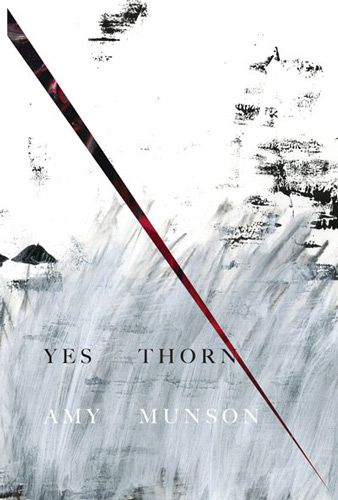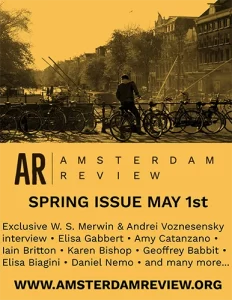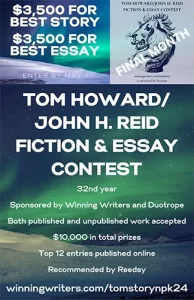Yes Thorn
You are most likely going to want a dictionary on hand to fully appreciate this deeply layered book of poems. I know: this may already be a nonstarter for some readers. But persevere and the rewards are plentiful. The best kind of gift is the one that keeps on giving, and that’s what this book does. You won’t need a dictionary for the whole experience, but Amy Munson is a poet with a wise and wide vocabulary.
You are most likely going to want a dictionary on hand to fully appreciate this deeply layered book of poems. I know: this may already be a nonstarter for some readers. But persevere and the rewards are plentiful. The best kind of gift is the one that keeps on giving, and that’s what this book does. You won’t need a dictionary for the whole experience, but Amy Munson is a poet with a wise and wide vocabulary.
I quickly discovered that this isn’t a volume of poems to be devoured in a short span of time as one might be able to consume, say, a new collection by Billy Collins or Mary Oliver. Yes Thorn is the winner of the Berkshire Prize and requires a different kind of attention and openness on the part of the reader, a willingness to wrestle with what might at first appear to be rather opaque meanings. But that is part of the intellectual charm of this collection whose poems I found myself returning to multiple times. The poems are not “difficult” necessarily, at least not in the sense that they ultimately frustrate comprehension . . . rather, they inspire a lively and engaged curiosity, in no small part due to the enchanting way the poet uses language. And that is quite an accomplishment, especially for a debut collection.
The very first poem is entitled “Altricial.” Yes, I had to look it up too. Altricial is an adjective meaning: a young bird hatched or born in an undeveloped state and requiring nourishment. And check out the lovely lyricism of the language:
A holiness, this
helplessness,
the mother’s tireless
kenotic reconnaissance [ . . . ]the gimme
litany squalling from
the eternal central yawn,
the same way I wake
each morning crumpled and
ravenous, limbs stilted
as puppetry, to light
like an afterbirth,
wondering if the soul’s
a vestigial investment.
I have to believe that “kenotic reconnaissance” are two words that have rarely (if ever) been put together in the history of printed English. And just saying them together out loud is an auditory pleasure. Kenotic is also one word I didn’t have to look up! One of the few perks of having a degree in Religion Studies and theology is knowing that the word has to do with divine self-emptying. And in fact, Munson is a religious poet in the broad sense: not dogmatic, but open to the eternal mysteries of “sexuality, divinity, and love” as it says on the back cover of the book. For example, her poem “Congenital” plays with the notion of Original Sin as an inherited condition:
Inside every heart
slumps the same
silk-fleshed figbitten in the first
lost garden. First
relinquishing skin.Our paradox: carrion
that carries on,
tomb that mushroomsto coax its stone
aside, and inside
gauze, deflated,suggests the grave
we deserve yet
can never reenter.
Later, in the poem “The Company Of Animals,” the poet laments: “O what we break, what a hungry // God, what blood we lose / in proving love.”
And indeed, blood and sacrifice are themes threaded throughout this book, perhaps nowhere more powerfully executed than the poem “Ex Fractura Miraculum.” The poem is ostensibly about running over a rabbit’s nest with a lawnmower, beginning with the lines: “When the lawnmower nicks the rabbit’s nest the Lord / is oiled blade is downy socket is the knot of kits writhing / like wrung hands, because who’ll believe // holy without a broken body.” But a couple stanzas later the poet is making comparisons between herself and her ancestors who were “equally parochial, pickled, brined with denial.” This poem haunts me on so many levels. The image of baby rabbits writhing “like wrung hands” is unforgettable. And I am intrigued by how Munson ends the poem by levelling the lawn “flat as an altar, all injuries crypted beneath.”
Yes Thorn is organized into four untitled sections and the only hint for the origin of the title of the book comes in the poem “Prayer” when the poet asks: “If, Lord, / you were to return, could you / be more thorn?” My guess is the thorn might refer to the book of Genesis in the Hebrew Bible when Adam’s disobedience leads to the earth resisting his labor by throwing up thorns and thistles. But whatever the origin and inspiration, this wonderful book of poems will prick you and infect your imagination long after you have read it. I truly look forward to reading more of Munson’s work in the future.





